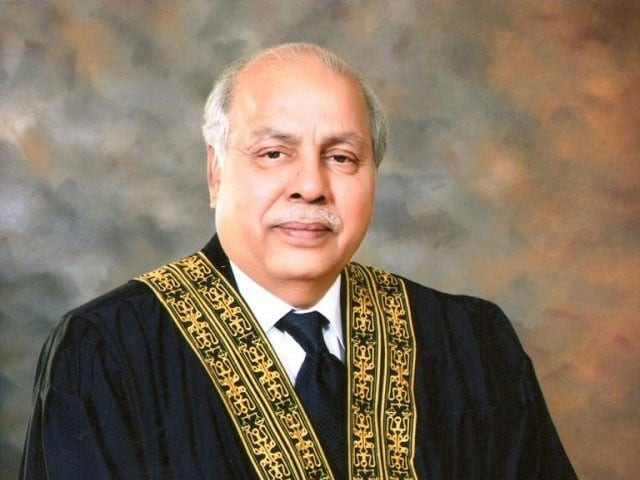Justice Gulzar leaves behind a mixed legacy
Outgoing CJP will be remembered for his anti-encroachment drive in Karachi

Chief Justice of Pakistan Gulzar Ahmed is retiring on Tuesday (tomorrow) by leaving behind the legacy of an anti-encroachment drive in the biggest city of the country, Karachi.
Justice Gulzar had taken oath as the CJP in December 2019. His tenure was adversely affected on account of the Covid-19 pandemic.
When he became the top judge, around 42,000 cases were pending in the Supreme Court. That number has now reached above 53,200. Despite an 11,000 increase, Justice Gulzar could not evolve a strategy to reduce the pending cases.
Even Justice Qazi Faez Isa in his judicial order gave a suggestion to hear cases online.
Justice Gulzar also initiated suo motu proceedings to examine the executive steps for controlling the spread of the coronavirus.
Also read: Judicial restraint and outgoing CJP’s swansong
The outgoing CJP mainly focused on removing encroachments in Karachi. He ordered the demolition of Nasla Tower as well as illegal houses built around Gujjar Nullah. At the end, he also ordered the relevant authorities to end commercial activities on the military land in Karachi.
Justice Gulzar further ordered to demolish a mosque and other encroachments built on amenity parks near Tariq Road in Karachi. Despite strong protests, he did not withdraw any order for the removal of encroachments in Karachi.
However, his orders for demolishing Nasla Tower and Gujjar Nullah houses have rendered thousands of families belonging to the lower middle-class homeless. One section of lawyers is questioning his orders to remove the encroachments as they were lacking substance.
A senior lawyer termed his anti-encroachment drive as “heartless”. "The way he evicted purchasers and demolished buildings did not punish the unscrupulous builders or officials but the common man who had been duped into buying them," he added.
He also complained about the outgoing CJP’s temperament during hearing of public interest matters. They also believe that his views were very strict in service matters wherein government employees hardly received any relief.
Also read: Law ministry notifies Justice Bandial's appointment as next CJP
In fact, some lawyers preferred to avoid arguing a case before his bench on account of his strict views in service matters. A lawyer said Justice Gulzar's jurisprudence was “pro-employers” rather than being “pro-employees”.
However, a senior law officer defended the outgoing CJP’s approach in service matters. He said the scope of review was very limited in service matters under Article 212 of the Constitution.
During his tenure, leaders of the opposition parties complained against the misuse of the power to arrest by the National Accountability Bureau (NAB) chairman. However, he did not give much attention to issues related to civil liberties.
The opposition leaders’ matters were fixed before those judges, who had a strict view on granting bail.
Former CJP Asif Saeed Khosa had introduced several reforms to improve criminal justice system. Model courts were established for speedy justice. However, the outgoing CJP could not give attention to this matter as his predecessor had.
Also read: CJ dismisses notion of judiciary being ‘under pressure’
Justice Khosa had also focused on clearing the pendency of criminal cases by forming two special benches. However, the pendency of criminal cases increased during the tenure of the outgoing CJP. Heirs of prisoners are complaining for not listing jail petitions for the last couple of years.
Unlike his predecessor, Justice Gulzar did not form larger or special benches comprising by senior-most judges. His critics always questioned his selection of judges to hear constitutional and public interest matters.
Justice Gulzar also went easy on the PTI-led government during his tenure. Attorney General for Pakistan Khalid Jawed Khan played a key role in maintaining a cordial relationship between the executive and him.
Even a three-judge bench led by him summoned Prime Minister Imran Khan in a suo motu case on the martyrdom of children in the Army Public School (APS) Peshawar attack.
Despite giving harsh remarks and observations against the maladministration and the federal government functionaries, the chief justice had not passed any coercive order during his tenure.
Also read: Strong judiciary a must for stronger country: Justice Shah
The Supreme Court had facilitated the federal government in a few matters like granting permission to hold general elections in Gilgit-Baltistan (G-B) region and tempered its stance in several cases when the court was requested to show judicial restraint.
The Sindh government, however, faced a tough time because of issues related to maladministration. However, no coercive order was passed against it too.
Interestingly, the outgoing CJP had strongly questioned different high courts’ judicial and administrative orders in the previous year. The SC had also set aside high court orders on the release of prisoners.
During outgoing CJP’s tenure, the Justice Qazi Faez Isa case has adversely affected the working of the Supreme Court. There is even a perception that SC judges have divided into two camps and few of them are being preferred by including them in benches hearing important matters while ignoring senior ones.
During his tenure, a few SC full court meetings were held to redress administrative issues.
A senior lawyer said the divide among SC judges had deepened during Justice Gulzar’s tenure and he could not provide leadership to end this perception.
Also read: The mixed legacy of CJP Nisar
Hamid Khan, another senior lawyer, criticised him for not fixing important cases wherein he was the counsel.
The lawyers of Balochistan questioned the outgoing CJP’s order wherein he had observed that Justice Isa should not hear matters related to Prime Minister Imran Khan. The opinion is divided regarding his conduct as the chairman of the Judicial Commission of Pakistan (JCP).
During his tenure, a serious debate was started for the first time among JCP members regarding the appointment of superior court judges.
Similarly, the efforts of Justice Gulzar cannot be ignored to end the sense of insecurity among minority communities. He took courageous steps to send a strong message to extremist elements that the judiciary would not spare anyone involved in usurping the rights of minorities.
The outgoing CJP made history by nominating Lahore High Court’s Justice Ayesha Malik for her appointment as the first female judge of the top court.
One section of lawyers also appreciates him for immediately dropping misconduct proceedings against Justice Isa – in his capacity as the chairman of the Supreme Judicial Council -- after the April 26, 2020 order despite a strong campaign by powerful circles.



















COMMENTS
Comments are moderated and generally will be posted if they are on-topic and not abusive.
For more information, please see our Comments FAQ